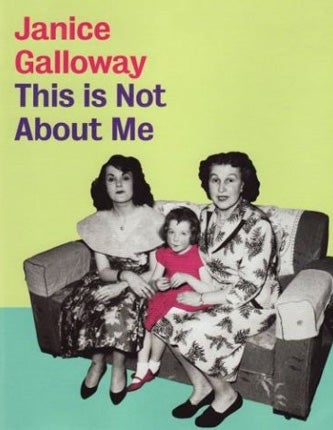This is not about me, By Janice Galloway
A sadistic daughter returns to a family in exile – and a novelist is born

Janice Galloway's searingly affecting memoir takes the reader from her first memories to the last year of primary school, when hormones flare and become kiss-chase serious.
It's not an easy read. Galloway's early life has all the misery-memoir ingredients. She was born into a household heading for meltdown. Her father, "Eddie" (Galloway has changed names, in order to get the distance to write by), was an alcoholic, accident- and temper-prone; her mother, Beth, hoping she was not pregnant with Janice, only acknowledged the truth when her waters broke. As Eddie's drinking worsens, Beth takes Janice and moves into a room above their doctor's surgery. Beth cleans in lieu of rent and there's no one to mind Janice. Every so often, moments of fun – singing games and sugar-sandwich picnics in the yard – break through the boredom and drudgery. But so does Beth's frustration: "I wish I didn't have this... I wish I'd never had you." One evening, after a cinema trip to see Snow White, Galloway's older sister Cora arrives, with suitcase and fags, without husband and baby. Cora is a huge, demanding, sadistic personality, bent on having a good time. She can't be trusted with an apple, let alone babysitting duties. Over the years, she gives Janice some of her best toys, a bloody nose, has sex in front of her, sets fire to her hair, and French-kisses a mouthful of ice-cream into her face and smears the rest of the bowl down her front. No wonder Galloway's default setting becomes observer. Before Cora's arrival, she spent hours watching out the window. After, there's no space for another way of being.
All first-person childhood memoirs lead to their author at the time of writing. They raise the question of how life has influenced vocation and craft – particularly, for obvious reasons, when such memoirs are written by professional writers. Whether, given a more comfortable background, Galloway would have still evolved into an accomplished author is moot: most people who start life like this don't grow up to be novelists. This memoir shows how and why she started developing one of the skills that characterises her fiction: the ability to decode and elucidate the harmonics of mood, temper and relationships.
Lisa Gee's 'Stage Mum' is published by Hutchinson
Join our commenting forum
Join thought-provoking conversations, follow other Independent readers and see their replies
Comments
Bookmark popover
Removed from bookmarks